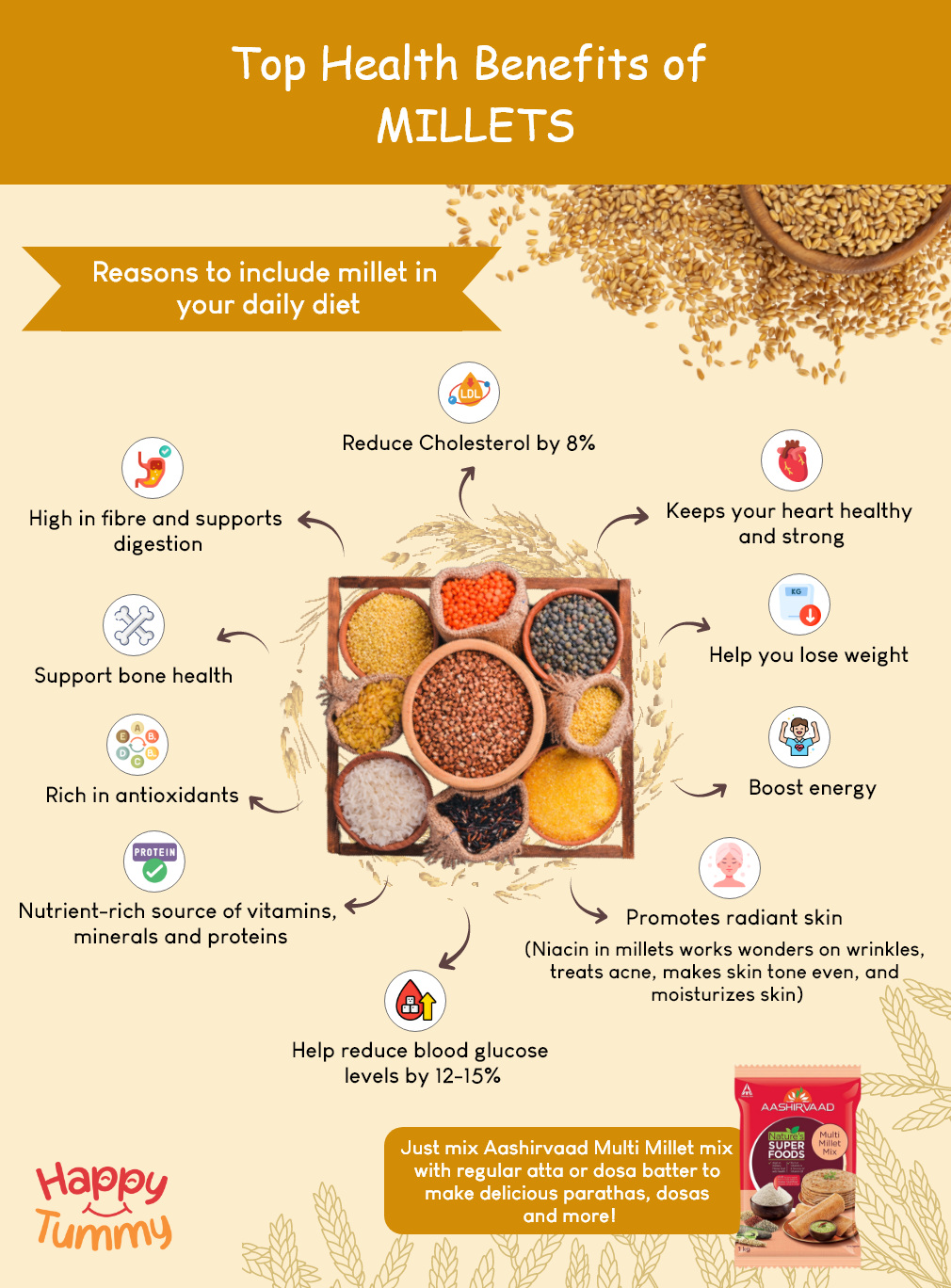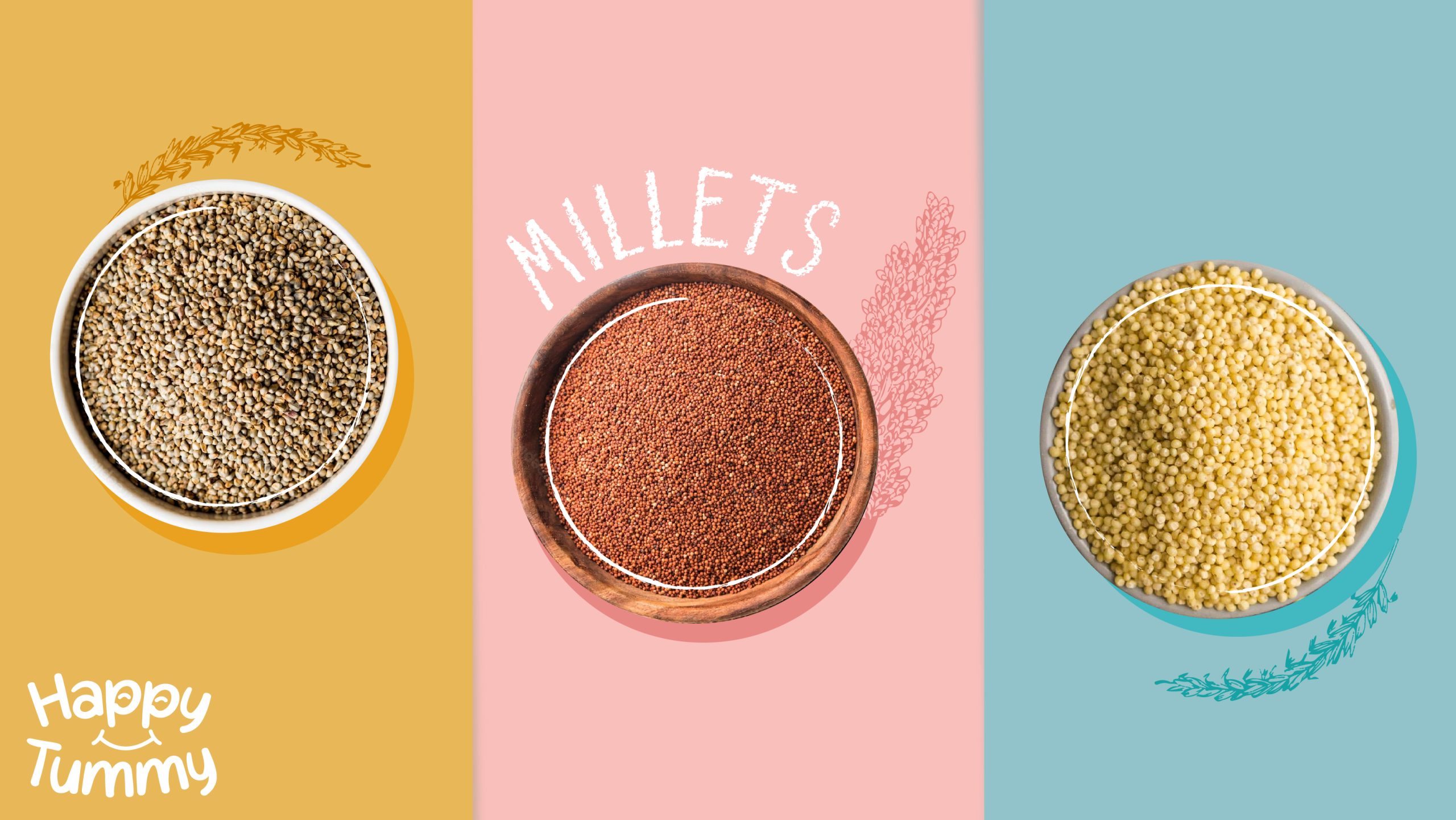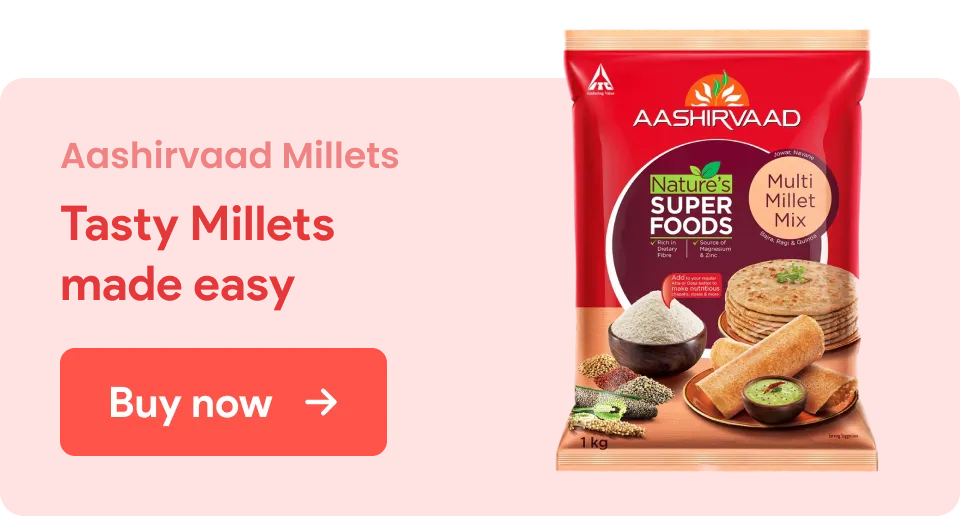Table of Contents
If millet could sing, they would be singing ‘Lost in Time’ by Celldweller.
And it is not just the lyrics that make it a perfect ode to millet’s past but the video too where a dinosaur is travelling through the past, present and future.
Why? Well, there was a time when millets were widely grown as a staple food and were an integral part of the local food cultures.
But they got Lost in Time.
Once trusted for providing essential nutrition and health benefits, they were forgotten and traded for more ‘refined’ food grains after the Green Revolution.
In India, there are several types of millet like Jowar, Bajra, Ragi, Foxtail millets, Porso millet, etc. While rural India never forgot millet and its benefits totally, urban India did lose to keep in touch with this highly nutritious food.
But they are back with a bang with the UN declaring 2023 as the International Year of Millets and are ready to rule the future.
What are the Different Types of Millets
- Sorghum Millet
- Pearl Millet
- Foxtail Millet
- Finger Millet
- Fonio Millet
- Brown top Millet
- Little Millets
- Buckwheat Millet
- Amaranth Millets
- Kodo Millets
Today, we will try to bring millet back into your kitchen. We will tell you the benefits hidden inside these small-seeded cereal crops that our previous generations loved so much.
What are the benefits of millet?

Besides being highly affordable, millet has several health and environmental benefits that make it a perfect addition to your daily food. Let’s check them one by one.
1. Millets support digestion
Millets support your digestive system in numerous ways
- High in fibre: Millets are a rich source of both soluble and insoluble fibre, which promotes healthy digestion and prevents constipation.
- Regulates bowel movements: The high fibre content in millet helps regulate bowel movements and prevent digestive disorders like irritable bowel syndrome.
- Promotes gut health: The fibre in millets acts as a prebiotic, promoting the growth of good bacteria in the gut and improving overall gut health.
- Reduces inflammation: Millets contain anti-inflammatory compounds that reduce inflammation in the gut and prevent digestive disorders like ulcers and inflammation.
- Eases digestion: Millets are easy to digest and do not cause digestive discomfort like bloating, gas, and cramping, which is often associated with gluten-containing grains.
Incorporating millet into your diet can help support healthy digestion by providing essential fibre, promoting gut health, reducing inflammation, and easing the digestion process.
2. Millets support your weight loss journey
Millets have a low glycemic index which reduces the risk of weight gain. The glycemic index is a rating system for food containing carbohydrates and how quickly our body absorbs them. Being low on the glycemic scale makes it suitable for people who are trying to lose weight. The fibre in millet promotes the feeling of fullness and helps you reduce your overall calorie intake.
Millets are also low in calories, and provide you with sustained energy, reducing the likelihood of you, overeating and snacking on unhealthy foods.
Also – How to manage weight with Millets
3. They are rich in nutrients
Millets are nutrient-rich because they contain a high concentration of essential vitamins, minerals, and antioxidants. Some key nutrients found in millets include:
- Minerals: Millets are high in essential minerals like magnesium, phosphorus, and potassium, which promote strong bones, heart health, and proper nerve and muscle function.
- Vitamins: Millets are a good source of B-complex vitamins, including thiamine, niacin, and folate, which support energy production and overall health.
- Protein: Millets are a good source of plant-based protein, which is essential for building and repairing tissues, and maintaining muscle mass.
4. Millets promote heart health
In a study led by the International Crops Research Institute for the Semi-Arid Tropics (ICRISAT), it was found that consuming millet reduces cholesterol by 8%.
The study also showed that low-density lipoprotein cholesterol or bad cholesterol as we commonly know it, decreased by 10%.
Millets are high in essential minerals like magnesium, which is essential for maintaining heart health and regulating blood pressure. Millets are a rich source of both soluble and insoluble fibre, which helps lower cholesterol levels and reduces the risk of heart disease.
5. Helps regulate blood sugar
Studies have proved that consuming millet helps in reducing blood glucose levels by 12-15%. Compared to its contemporary grains like wheat, maize, and rice; millets have a lower Glycemic Index score of just 52.7. This means that millet is slowly absorbed into the bloodstream, preventing rapid spikes in blood sugar levels. It can bring down the blood sugar and help you reduce your blood sugar to the pre-diabetic stage from the diabetic stage.
6. Millets are rich in antioxidants
Millets are a good source of antioxidants. Antioxidants are compounds that help protect the body against damage from free radicals. These free radicals can cause oxidative stress, contribute to chronic diseases and cause premature ageing. Some of the antioxidants found in millets include polyphenols, flavonoids, and carotenoids.
7. Supports bone health
Millets are rich in minerals like calcium, iron, magnesium, manganese, zinc, copper, potassium and phosphorus, which promote strong bones. One of the millet types, Finger millet or Ragi, contains 5-30 times more calcium than the other food grains which is very crucial for bone health.
8. Millets are gluten-free
Gluten is a type of protein found in wheat, barley, and people with gluten intolerance must avoid these grains. Millets, are not related to these grains and do not contain gluten, making them a safe and suitable option for individuals with celiac disease or gluten intolerance.
If you are gluten intolerant and you continue to eat glutenous food, you may experience several digestive concerns and also gain weight as well.
9. Boosts energy and immunity
Being rich in nutrients like Vitamin B1 and minerals like iron and magnesium, millets boost our immunity and provide strength to the body to fight against diseases. It is a great source of energy to stay active throughout the day.
Millets enhance our body’s metabolism, boosting the growth of good bacteria in the guts which in turn helps our body to fight food-borne diseases and common infections.
10. Supports skin health
If you know anything about skincare you must have heard about niacin. Niacin is popularly known as niacinamide and is found in many skin care products. It works on wrinkles, treats acne, makes skin tone even, and moisturizes the skin.
While these were all the health benefits that millets offer, there are some more benefits, these grains bring to the world.
11. Sustainable source of nutrition
According to the UN, millets can help solve the global agrifood challenge of feeding the ever-growing population as they are nutritious and affordable. It can eliminate hunger in the world, serve as a source of income for small farmers, achieve sustainable development, promote biodiversity and can adapt to the changing climate.
12. Environment friendly
Millets require 70% less water to grow compared to rice and take half the time to grow when compared to wheat. It also requires 40% less energy for processing. They are hardy crops and thus can withstand extreme weather conditions specially heat.
Incorporating millet into your diet is a simple and tasty way to promote good health and well-being. There are so many ways you can include this superfood into your daily diet. The easiest is to add multi-millet flour to your regular flour and enjoy the benefits of this nutritious cereal.
It is gluten-free, helps in reducing and managing weight, provides so many health benefits and is supported by the United Nations for its crucial role in the food system. If this doesn’t calls for a shoutout to millet, what will?
Looking for a convenient way to add millet to your diet without giving up on your favourite chapatis and dosas? Try the Multi-Millet mix today. Get the power of 5 millets in every bite without putting in any extra effort. Just add 1 cup of this mix to 3 cups of your chapati flour (atta) or dosa batter and cook how you normally do. Your nutrient-rich chapati and dosa are ready to serve!
Also read in Hindi- मिलेट्स : प्राकृतिक पोषण का खजाना















